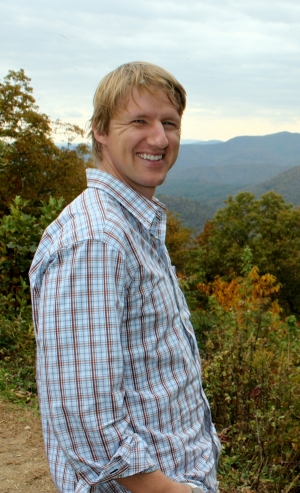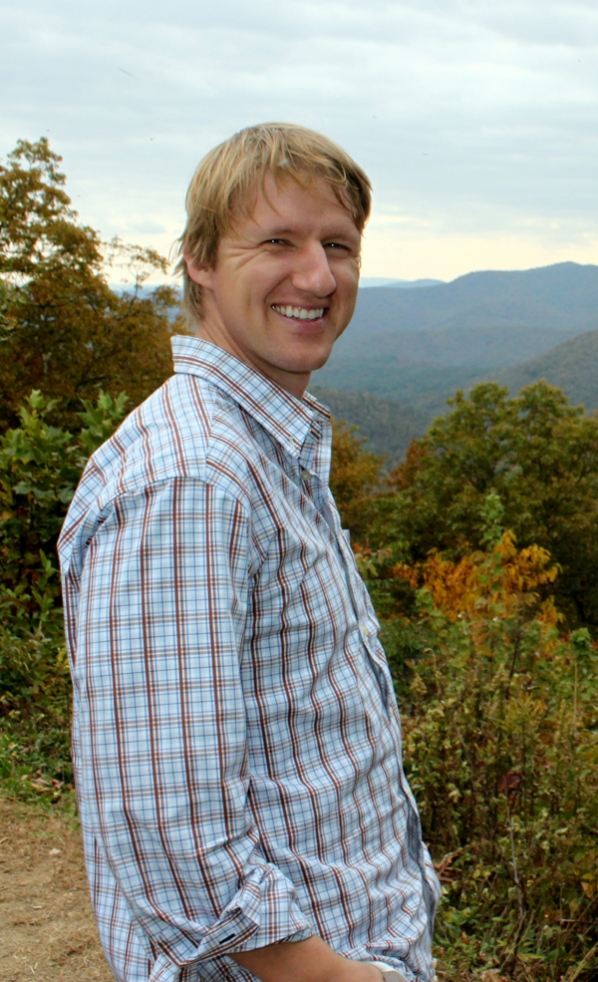Dr. Cameron Gokee is an assistant professor in the Department of Anthropology at Appalachian State.
Dr. Gokee is originally from a small town in Northern Michigan called Petoskey. However, he has lived in North Carolina for roughly five years and has been in Boone for over three of those years. Dr. Gokee is married to fellow Appalachian State Professor, Dr. Alice Wright. Both are professors in the Department of Anthropology. Together they have a two-year-old son named Emmett. Despite what student’s may think, Professors do have a life outside of the department. Dr. Gokee prefers uses that free time to go mountain biking and play Ultimate Frisbee. He is also currently learning to play the guitar.
In 2002, Dr. Gokee got his undergraduate degree in anthropology with a concentration in archeology from Case Western Reserve University. He had always been good at math and science but when he came to college he was unsure what career he wanted to use those skills in. Like many freshman he bounced around from different interests like engineering, pre-med, and chemistry. During his freshman year he took an Intro to Archeology course. This course ignited his interest in anthropology and led him to take Intro to Cultural Anthropology and Biological Anthropology classes and from there his career was decided.
Before teaching at Appalachian State, Dr. Gokee worked in various jobs related to the field. While he still only had his BA in archeology he worked multiple Cultural Resource Management jobs. He has worked for the Museum of New Mexico and has also done some CRM work in North Carolina. For a time he also worked at a State Historic Park in Michigan. Dr. Gokee emphasized how Cultural Resource Management is one of the types of careers those with just a BA in archeology can pursue. In 2012, he got his Ph. D. and Masters at the University of Michigan in anthropology. While at the University of Michigan he also gained an African Studies Certificate.
Dr. Gokee has focused much of his work on research in West Africa. He is currently working on the Bandafassi Regional Archeology Project. This project studies the past thousand years in the region and focuses on how different groups have interacted with one another culturally, politically, and economically. He has also been working as an archeologist on the Undocumented Migration Project. The project focuses on undocumented immigration in Southern Arizona over the last twenty years. Within the more specialized field of archeology, Dr. Gokee is interested in spatial analysis and working with Geographic Information Systems. He enjoys looking at spatial relationships and using that data to help us learn about people from the past. When asked about his proudest accomplishment within the field of anthropology, Dr. Gokee said it was finishing his book, Assembling the Village in Mediveal Bambuk. His book blended his focus on West Africa with his interest in spatial relationships.
For Dr. Gokee teaching was a natural progression of his love for the subject. It allows him to share the personal pleasure he gets out of research projects with others. Teaching gives him the medium to engage the broader public with archeology. Dr. Gokee expressed how he loves when he gets to teach general education classes because it gives him the chance to expose students to other cultures that they usually would not get to encounter. For those who are taking his general education courses he tries to help them further develop their critical thinking skills and analyze how anthropological evidence changes how we view people in the past. However, for students who are in the major and taking upper-level courses, Dr. Gokee views himself more as a guide through debates and to foster conversation. Rather than bombarding people with just facts and information he likes to present big questions about what it means to be human and how we can answer those questions through archeology.
When asked what he likes most about the Anthropology Department, Dr. Gokee expressed how he values the way App State’s Anthropology Department has a strong focus on teaching and engaging undergraduates. He explained how the department has a relatively large faculty in relation to the number of students. The department also tends to put a stronger emphasis on research for undergraduate students than other schools because the department currently does not have a graduate program. Dr. Gokee shared how he felt this allows for more investment in undergraduate students and more hands on experience because they are the department’s main focus.
Next time you’re thinking about trying out a new subject, consider taking a general education anthropology course with Dr. Gokee. His passion for the subject will definitely leave an impression.
By Amanda Lancaster
About the Department of Anthropology
The Department of Anthropology offers a comparative and holistic approach to the study of the human experience. The anthropological perspective provides a broad understanding of the origins as well as the meaning of physical and cultural diversity in the world – past, present and future. With nearly 200 undergraduate majors, the department offers numerous research opportunities for students including field schools, internships, lab projects and independent studies at home and abroad. Students may earn B.A. and B.S. degrees with concentrations in sociocultural anthropology, archaeology, biological anthropology, and social practice and sustainability.
About the College of Arts and Sciences
The College of Arts and Sciences is home to 16 academic departments, two stand-alone academic programs, two centers and one residential college. These units span the humanities and the social, mathematical and natural sciences. The College of Arts and Sciences aims to develop a distinctive identity built upon our university's strengths, traditions and unique location. Our values lie not only in service to the university and local community, but through inspiring, training, educating and sustaining the development of our students as global citizens. There are approximately 5,850 student majors in the college. As the college is also largely responsible for implementing Appalachian's general education curriculum, it is heavily involved in the education of all students at the university, including those pursuing majors in other colleges. Learn more at http://cas.appstate.edu
About Appalachian State University
Appalachian State University, in North Carolina’s Blue Ridge Mountains, prepares students to lead purposeful lives as global citizens who understand and engage their responsibilities in creating a sustainable future for all. The transformational Appalachian experience promotes a spirit of inclusion that brings people together in inspiring ways to acquire and create knowledge, to grow holistically, to act with passion and determination, and embrace diversity and difference. As one of 17 campuses in the University of North Carolina system, Appalachian enrolls about 19,000 students, has a low student-to-faculty ratio and offers more than 150 undergraduate and graduate majors.

